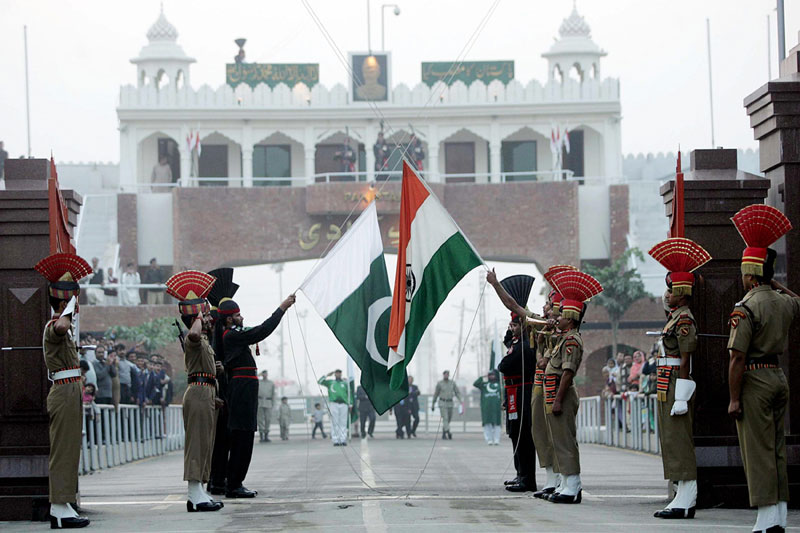t is impossible to believe that Pakistan would accept the Line of Control as a permanent border between the two nations
Every time a Pakistani president or prime minister arrives on a visit to India, the Indians start hoping that this could be the beginning of a new relationship between the two nations. Indian prime ministers, whether belonging to the UPA or the NDA, have been quite enthusiastic.
While Manmohan Singh is desirous of visiting Pakistan shortly and had a few years ago advised the visiting Indian cricket team to ‘win the hearts’ (dil jeet lo) in Pakistan, Atal Behari Vajpayee had flagged the ‘Samjhouta (reconciliation) Express’ – a train between the two countries. Media, particularly in India, goes abuzz describing the ‘baby steps’ that the two neighbours may have taken towards each other. Similar reactions were observed during the brief personal visit of president Asif Ali Zardari.
Such a feeling indeed makes sense, particularly in terms of the economics, because between them the two countries spend US$ 50 billion annually on declared defence budget (2011-12 figures). With the absence of tensions between the two countries -- that have gone to war four times in the past – a large proportion of these funds could be diverted to more productive use such as primary health and education that need urgent attention in both these nations. In fact, India’s defence budget for the current year is $ 41 billion. Most Indians have wished that an improvement in two-way trade will heal the past wounds and a new chapter in Indo-Pak relations will somehow open up.
However, the ground realities are different and all the good wishes have little chance of coming true in the foreseeable future. The contentious issues are that of the recurrent terrorist attacks on Indian cities – 26/11 being a major one – and the ever-present unsolved problem of Kashmir. Of course, then there is the Aksai Chin gifted by Pakistan to China which has now become a triangular problem. Pak president Zardari has invited Manmohan Singh to a state visit, but the former is totally evasive on handing over Hafiz Saeed – the terrorist mastermind wanted by India.
When our government talks to the Pakistani government, it is at best only one quarter of the story. Our government, obviously, cannot speak to either the ISI or Pak military commanders or to the terror groups who are a law unto themselves. Each one of these broad groups is equally important in influencing – many a time directing – the Pakistan’s policy towards India. Military commanders, when not moderated by civilian government – would always desire a combative stance. Without a skirmish, their existence would remain in question.
Tricky situations
To this, one must add the complications introduced by China. China has border problems with India – Tibet still being a sore point and a threat – and needs a comrade. An enemy’s enemy being one’s friend, Pakistan fits the bill. China has an interest in keeping the Indo-Pak feud alive and kicking or else it will lose an ally in fighting the threat of economically rising India. China will invest in Pakistan financially and support it militarily and diplomatically at international forums and other tricky situations whenever necessary. It will do all it can to ensure that Pakistan will remain a staunch adversary to India.
The Indo-Pak problem is no longer just a bilateral problem; it is a multilateral problem. With our recent vote against Sri Lanka in UNHRC, we may have added one more adversary to the list. This newly disenchanted neighbour has been helped by China in a big way at the UN. The complaint with IAEA regarding our nuclear power plants operating close to its borders may just be the beginning of a possibly tetchy relationship. A strong Indo-Pak nexus should be in Sri Lanka’s economic interest. But with regard to the Tamil question, Sinhalese sentiments may overtake hard logic.
Nepal has always had unsure relationship with India which it largely perceives as a bully rather than as a benevolent big partner. Therefore, between the two ‘big brothers’ – China and India – it would obviously prefer to take sides with the bigger brother. It is unfortunate that, we have persisted with such a high-handed foreign policy with our smaller neighbours that we find ourselves left alone. Any tilt in Indo-Pak policy has to be a part of a total shift in our policy towards all our neighbours.
Then, Indo-Pak problem can not be solved without a solution to the Kashmir problem. To us Indians, Kashmir is a territorial dispute – a part of land usurped by a neighbour. To Pakistanis, it hits at the core of the creation of their nation. Pakistan has been, to most of its people, the ‘pure’ land i.e. for the followers of Islam. Some political pundits suggest that the LoC can be accepted as the permanent border between the two nations. But, it is difficult to believe that Pakistanis would accept such a solution. Moreover, what the Kashmiris want may be a separate nation state. Add to this the problem that a portion of POK has been handed over to China.
What Pakistan as a nation thinks is more important than what India thinks about India-Pakistan relations. What the Kashmiri people think about resolving the issue of Kashmir is the next step in untying the knotty problem. Indian government and its people have always been nostalgic about the joint family that India was at one point in time. The task before India is to facilitate a transformation in Pakistan and in Kashmir – both on our side and their side. India should also ensure a solid goodwill among our neighbour nations. Empty talk, meetings and summits and sentiments serve no purpose



0 comments:
Post a Comment